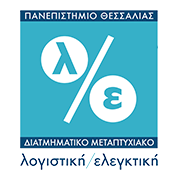Auditing I
(1) GENERAL
| SCHOOL | SCHOOL OF ECONOMICS AND BUSINESS | ||||
| SECTION | DEPARTMENT OF ECONOMICS AND DEPARTMENT OF ACCOUNTING & FINANCE | ||||
| LEVEL OF STUDIES | POSTGRADUATE LEVEL | ||||
| COURSE CODE | MSC0104 | SEMESTER OF STUDY | 1 | ||
| COURSE TITLE | AUDITING I | ||||
|
INDEPENDENT TEACHING ACTIVITIES |
WEEKLY TEACHING HOURS | CREDIT UNITS | |||
| LECTURES | 3 | 8 | |||
|
TYPE OF COURSE |
REQUIRED |
||||
| PREREQUISITE COURSES: | NO | ||||
| LANGUAGE OF TEACHING AND
EXAMINATION: |
GREEK / ENGLISH | ||||
| THE COURSE IS OFFERED TO ERASMUS STUDENTS | NO | ||||
| ELECTRONIC COURSE PAGE (URL) | https://eclass.uth.gr/ | ||||
| Upon successful completion of the course, the learning outcomes are:
• learning the definitions and key/ selected points of the ‘internationally applicable’ Internal Audit Framework • learning key points of the International Auditing Standards • in-depth learning of points of certain International Auditing Standards |
| Learning Outcomes |
|
• Search, analysis and synthesis of data and information, using both the necessary technologies • Decision-making • Autonomous work • Teamwork • Working in an international environment • Working in an interdisciplinary environment • Generating new research ideas • Respect for the natural environment • Demonstrate social, professional and ethical responsibility • Promoting free, creative and inductive thinking |
| General skills |
- LEARNING OUTCOMES
| The aim of the course is, on the one hand, to familiarize students with the concept of auditing and the range of audit and, on the other hand, to develop – mainly through
examples – the students’ ability to analyse and also to draw up a summary control report (certificate). More specifically, during the teaching of the course the following modules will be covered: • Framework for the Professional Conduct of Internal Audit • International Auditing Standards (according to which, under Law 3693/2008, mandatory audits are currently carried out in our country, as published in the Official Gazette 2848/23.10.2012 (issue B) following the decision 41658/722 of the Ministry of Finance • general audit principles and responsibilities of auditors, assessment and treatment of the audit risk, audit evidence, use of third party work, audit conclusions and certificates. • special purpose financial statement audit and related services (review of financial statements, agreed upon procedures, mergers and acquisitions) elements). • the purpose of the worksheets drawn up by auditors, and general principles the drafting of these • internal and external control of income and expenditure, staff remuneration and expenses, and cost of goods produced and sold • the impact of the auditors’ observations on the key figures of the financial statements |
- COURSE CONTENT
- TEACHING and LEARNING METHODS – EVALUATION
| MODE OF DELIVERY. | On Site & Distance Learning – Hybrid Room | |||
| USE OF INFORMATION AND COMMUNICATION TECHNOLOGIES | Use of a hybrid room that includes a large wall-mounted screen on which participants are presented by
distance. The connection to the course is made through the Microsoft Teams software, in which a camera in the room records and displays the teacher. The course is also followed using the Wacom digital stylus, which ensures the interactivity of the course with notes that appear directly on the students’ screen. In addition, slides are projected, use of the asynchronous education platform for the posting of course materials, students’ assignments and the communication between lecturers and students, search for electronic journals and resources. |
|||
| ORGANISATION OF TEACHING | Activity | Semester workload | ||
| Lectures | 36 | |||
| Study, preparation and
presentation Activities |
146 |
|||
| Study and analysis of the literature
(preparation of lectures & exams) |
55 |
|||
| Final written examination | 3 | |||
| Total Course |
240 |
|||
| STUDENT ASSESSMENT | Assessment is in Greek or in English and consists of written individual/group work and written examinations at the end of the semester. | |||
- RECOMMENDED-BIBLIOGRAPHY
| – Suggested Bibliography:
-Framework for the Professional Conduct of Internal Audit (IIA publications, translation EIEEE, 2008)
-Auditing : Γ. G.G. Alifantis (Diplografia Publications, 2016)
-Notes by I. Filos |
You may also like
Research Methodology 1
SCHOOL ECONOMIC AND ADMINISTRATIVE SCIENCES SECTION ECONOMIC SCIENCES AND ACCOUNTING & FINANCE LEVEL OF STUDIES POSTGRADUATE STUDY PROGRAMME COURSE CODE MSC0105 SEMESTER OF STUDY 1 COURSE TITLE RESEARCH METHODOLOGY I …
Financial Accounting I
GENERAL SCHOOL SCHOOL OF ECONOMICS AND BUSINESS SECTION DEPARTMENT OF ECONOMICS AND DEPARTMENT OF ACCOUNTING & FINANCE LEVEL OF STUDIES POSTGRADUATE LEVEL COURSE CODE MSC0102 SEMESTER OF STUDY 1 COURSE …
FInancial Analysis I
GENERAL SCHOOL SCHOOL OF ECONOMICS AND BUSINESS SECTION DEPARTMENT OF ECONOMICS AND DEPARTMENT OF ACCOUNTING & FINANCE LEVEL OF STUDIES POSTGRADUATE LEVEL COURSE CODE MSC0101 SEMESTER OF STUDY 1 COURSE …

